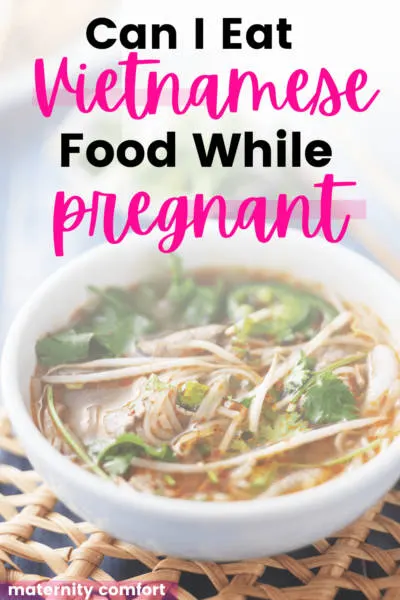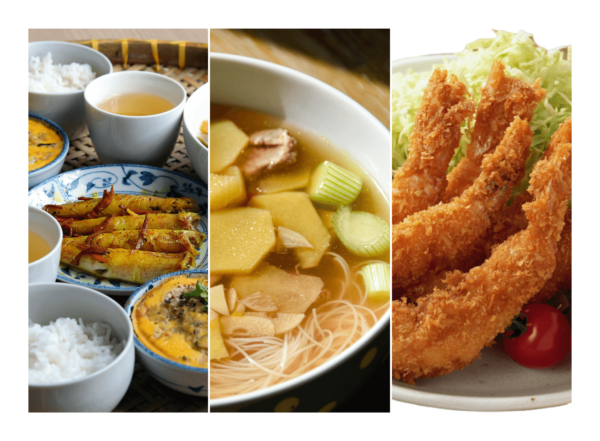Updated May 8, 2023
Are you expecting and wondering: Can I eat Vietnamese food while pregnant?
You’re in luck!
You do not have to give up your favorite Vietnamese dishes!
While there are a few precautions you should take, many traditional Vietnamese recipes are safe for pregnant women to enjoy.
Keep reading for a list of some pregnancy-safe favorites.

Can I eat Vietnamese food while pregnant?
Yes, you can eat Vietnamese food while pregnant.
Vietnamese cuisine typically features fresh ingredients and minimal processing, making it a nutritious option for expectant mothers.
Vietnamese cuisine can be a great choice during pregnancy, as long as you take a few precautions.
first, avoid dishes that are high in mercury, such as squid, and mackerel.
You should also limit your intake of shark, swordfish, and tuna.
In addition, steer clear of raw or undercooked meats and fish, as well as unpasteurized dairy products.
That includes fish and shellfish.
Raw seafood is not safe to consume in pregnancy.
If you’re unsure about a particular dish, ask your server for more information.
What Vietnamese foods can I eat while pregnant?
One of the great things about Vietnamese cuisine is that it is very healthy.
There are plenty of fresh vegetables and lean protein options to choose from.
When you’re pregnant, you want to make sure that you’re getting plenty of nutrients, and Vietnamese food can definitely help with that.
Here are some safe Vietnamese dishes to enjoy during pregnancy:
- Pho: This popular soup is made with rice noodles, lean beef, and plenty of healthy vegetables. It’s a great option for a quick and easy meal.
- Goi Cuon: These are fresh spring rolls made with shrimp, pork, rice noodles, and vegetables. They’re light and refreshing and make a great appetizer or main dish.
- Cha Gio: These are fried egg rolls made with pork, shrimp, and vegetables. They’re a bit heavier than goi cuon, but still, make a delicious and satisfying meal.
- Bahn Mi: This is a Vietnamese sandwich made with pickled vegetables, fresh herbs, and either pork, chicken, or tofu. It’s a great option for a quick and easy snack or meal.
- Banh Xeo: This is a savory pancake made with shrimp, pork, and vegetables. It’s delicious and filling.
- Ca Kho To This is a braised fish dish that is full of flavor. It’s usually made with catfish, but you can use any type of fish that you love.
- Ga Nuong: This is grilled chicken that is marinated in a variety of spices. It’s a great option for a healthy and flavorful meal.
- Bo Luc Lac: This is a dish of stir-fried beef that is full of flavor. This is a satisfying meal.
- Mi Quang: This is a noodle dish that is made with shrimp, pork, and vegetables.
Just be sure to avoid anything that is too greasy or fried, and stick to lean protein and fresh vegetables.
The most important thing to remember when ordering or making Vietnamese dishes is to be sure they are thoroughly cooked.

Vietnamese food to avoid when pregnant:
Sprouts:
Various types of spouts (bean sprouts, alfalfa sprouts, and clover) are often sprinkled on top of Vietnamese food as a final topping before the dish is served.
Since the sprouts are not cooked, they can be a source of bacterial contamination.
So the practice of adding that final dash of sprouts to the top of your soups and other meals should be avoided.
Raw meat of any kind:
Many Vietnamese dishes contain raw meats.
During pregnancy, in particular, all raw meats should be avoided.
Even if you know the supplier carries fresh food, meats of any kind can harbor bacteria that can cause food poisoning.
Raw Seafood of any kind:
Raw seafood is also common in Vietnamese foods as it is in the cuisine of many other countries.
Again, like meat, there is the risk of food-borne pathogens in raw seafood even if it is fresh-caught seafood and is eaten the same day.
These precautions apply to any of the meal preparations listed below.
Can you eat beef pho while pregnant?
Yes, it is safe to eat beef pho while pregnant.
Beef Pho is a type of Vietnamese soup that typically contains beef, broth, rice noodles, and a variety of herbs and spices.
The soup is often garnished with green onion, cilantro, bean sprouts, lime wedges, and chopped peanuts.
Pregnant women need to be sure that the beef is thoroughly cooked.
Rare beef pho is not safe to eat during pregnancy.
Hopefully, this answers the question can I eat pho while pregnant?
Yes, you can just make sure the beef tendon is cooked well and the broth doesn’t have too much sodium in it.
Can you eat chicken pho while pregnant?
It is safe to eat chicken pho while pregnant as long as it is cooked thoroughly.
In fact, chicken pho has a lot of nutritional value and is high in protein.
The one concern with chicken soup as is the case with many soups is to watch how much sodium you consume, particularly during pregnancy since it can affect blood pressure and cause swelling.

Can I eat Bahn Mi while pregnant?
Yes, you can eat Bahn Mi during pregnancy as long as you follow a few simple safety precautions.
Bahn Mi is a Vietnamese sandwich that is traditionally made with pork, but it can also be made with chicken or tofu.
Be careful when ordering Bahn Mi, many Vietnamese restaurants use pate as one of the sandwich ingredients.
Pate is not safe to consume during pregnancy.
You need to make sure they do not include it as an ingredient in your sandwich.
You’ll also want to avoid Bahn mi sandwiches that use cold cuts that are not heated.
Bahn mi sandwiches often include pickled vegetables
The main concern with eating Bahn Mi while pregnant is the risk of Listeria infection.
Listeria is a type of bacteria that can cause miscarriage, stillbirth, or premature delivery.
Pregnant women are particularly susceptible to Listeria infection, so it is important to take care when eating foods that may be contaminated with the bacteria.
However, as long as the Bahn Mi is made with freshly cooked meat and vegetables that have been washed thoroughly, it should be safe to eat during pregnancy.
Can I eat Goi Cuon during pregnancy?
Yes, you can eat Goi Cuon while pregnant.
Goi Cuon, also known as summer rolls, is a type of Vietnamese dish made with rice paper wrappers and a variety of fillings.
Common fillings include shrimp, pork, veggies, and rice noodles.
I’ve also seen them made with cooked Salmon, rice, and fresh veggies.
While goi cuon is generally considered to be a healthy food choice, there are some potential risks to eating them during pregnancy.
It is important to only eat goi cuon that is made with shrimp and pork that have been completely cooked.
There is a risk of food-borne illness from eating undercooked shrimp and pork.
Pork and shellfish are two foods we don’t mess around with when it comes to being cooked enough.
Raw and undercooked shellfish can carry harmful bacteria and toxins that can make you and your unborn baby seriously ill.
In Vietnamese pregnancy traditions, expecting women are told to not eat raw shellfish such as shrimp and crabs.
Can I eat Cha Gio while pregnant?
Cha Gio is Vietnamese spring rolls and includes pork, rice, mushrooms, and noodles.
Since they are usually deep-fried they are safe to eat during pregnancy.
Assuming the deep frying is long enough to thoroughly cook the contents.
As with many other sides, the dipping sauces that are used need to be heated adequately, and the addition of sprouts or other toppings needs to be avoided.
Can I eat hoisin sauce while pregnant?
Pregnant women can eat hoisin sauce in moderation.
Hoisin sauce is a popular condiment made from soybean paste, sesame oil, garlic, vinegar, sugar, and chiles.
It is safe to eat hoisin sauce during pregnancy.
Hoisin sauce is often used as a dipping sauce in Vietnamese cooking.
Pregnant women may find that hoisin sauce causes heartburn and indigestion so it is best eaten in moderation.
Can I eat tendon while pregnant?
Yes, you can eat tendon while pregnant.
Beef tendon is a common ingredient in beef pho.
It’s important to cook the tendon thoroughly.
The raw or undercooked tendon can contain bacteria that may be harmful to you and your baby.
Tips for eating out in restaurants while pregnant:
- Avoid buffets – you don’t know how fresh the food is or how well it’s been cooked.
- Stick to restaurants that you know and trust – this way you can be sure that the food is fresh and of good quality.
- When in doubt, ask your waiter or waitress for recommendations on safe dishes to eat while pregnant.
- Order simple dishes that are easy to digest.
- Avoid anything with raw eggs or undercooked meat.
- Drink plenty of water and avoid caffeine and alcohol
- Beware of hidden sources of sodium in restaurant food
- Avoid foods made with unpasteurized dairy products.
- Don’t be afraid to ask for a modification to your meal!
Most Common Food-Borne Illnesses
- Listeria
- Salmonella
- E Coli
- Mold
- Campylobacter
- Botulism
These pathogenic bacteria can be found in foods that are not kept at the proper temperature, stored improperly, or that are undercooked.
To reduce your risk of foodborne illness during pregnancy you want to pay close attention to how you prepare, cook and store the foods you eat
Common symptoms of foodborne illness from undercooked meats are:
- Nausea
- Vomiting
- Diarrhea
- Stomach cramps
- Fever
List of foods to not eat when pregnant:
- Foods that are not pasteurized– certain types of cheese like soft cheeses, Brie, Blue Cheese, etc.
- Certain types of fish– shark, swordfish, anything high in mercury
- Raw eggs hollandaise sauce, homemade mayonnaise, homemade eggnog, and runny eggs.
- Undercooked meats– lunch meats. Deli meats.
- Hot foods that are not “hot”, avoid hot foods that have been sitting out without a warming source. Same for foods that should be eaten cold. If no ice or refrigeration source is keeping the food cold, take a pass.
- Caffeine– soda, chocolate, and energy drinks. (Limit your caffeine to less than 200 mg a day)
- Herbal Teas (There are so many ingredients in herbal teas so it is best to avoid them simply. Green tea is OK.)
- Alcohol: There is no known safe amount of alcohol during pregnancy. Avoid sauces made with alcohol, desserts made with alcohol, and all alcoholic beverages.
List of Foods you should eat during pregnancy:
- Avocado
- Oatmeal
- Pinto Beans
- Black beans
- Arugula
- Bananas
- Dark Green Leafy Vegetables
- Brussel sprouts
- Carrots
- Green Beans
- Eggs
- Lean Meats
- Apples
- Oranges
- Salmon
- Shrimp
What should a pregnant woman eat daily?
A pregnant woman needs to consume various nutrients every day to support her health and the development of her baby.
Protein is essential for building new tissue and can be found in meat, poultry, fish, legumes, and eggs.
Calcium is necessary for strong bones and teeth and is especially important during the third trimester when the baby’s skeleton is rapidly developing.
Pregnant women should aim to get 1000 mg of calcium per day from low-fat dairy products such as milk, yogurt, and cheese.
Iron is also important for the formation of new blood cells, and pregnant women need about 27 mg of iron per day.
Tips for eating healthy during pregnancy:
Eating healthily during pregnancy is important for both the mother and baby.
Here are some tips to help make sure you are getting the nutrients you need:
- Eat a variety of fruits, vegetables, whole grains, and lean protein. This will help ensure you get the vitamins, minerals, and fiber you need.
- Avoid processed foods, sugary drinks, and excessive amounts of caffeine. These can all lead to unhealthy weight gain and other problems during pregnancy.
- Drink plenty of water. Staying hydrated is important for both your health and the baby’s health.
- Don’t skip meals. Eating small, frequent meals will help to keep your energy up and prevent you from overeating later on.
Final Thoughts
As is the case with so many different types of cuisines, the three most important factors that will keep your food safe to eat during pregnancy or at any other time are the following:
- Make sure the foods you consume are fresh and from the time it is caught or harvested is stored properly to prevent the growth of bacterial contaminants. Also, just because it is freshly caught or processed does not mean the meat or seafood could not have parasites or bacteria that may not be removed with cleaning.
- Never eat raw meat or seafood and avoid raw vegetables or toppings that could be contaminated.
- Heat meats and seafood to at least 165 degrees to safely kill any potential sources of food poisoning. When possible, use a meat thermometer to make sure the inside is thoroughly cooked as well.
Vietnamese food is a delicious and healthy cuisine to enjoy while pregnant.
There are some foods that should be avoided, but with a little knowledge, you can easily enjoy many of the dishes this cuisine has to offer.


